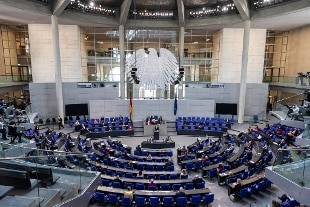In Germany, the chancellor is the head of the government and each party stands in the elections with an informal candidate for this role. His election is described in Article 63 of the Basic Law (Grundgesetz) of the Federal Republic of Germany. The vote of the electors is to renew the Bundestag, while there is no direct election of the chancellor even if in this election campaign there has been much talk of the respective chancellor candidates. The chancellor is elected by the Bundestag once a governing coalition has been formed, which can take a long time. The federal president proposes a candidate on which the deputies vote by secret ballot without previous debate. The chancellor is considered elected if he receives an absolute majority of the votes of the Parliament.If the proposed candidate is not elected, the Bundestag may, within fourteen days of the vote, elect a Federal Chancellor by a majority of its members. If a vote is not taken within this period, a new election takes place immediately, in which the one who obtains the highest number of votes is elected. If the person elected brings together the votes of the majority of the members of the Bundestag, the federal president must appoint him within seven days of the election. If the elected does not reach such a majority, the federal president must nominate him or dissolve the Bundestag within seven days. Only Parliament can also dismiss the chancellor.If a vote is not taken within this period, a new election takes place immediately, in which the one who obtains the highest number of votes is elected. If the person elected brings together the votes of the majority of the members of the Bundestag, the federal president must appoint him within seven days of the election. If the elected does not reach such a majority, the federal president must nominate him or dissolve the Bundestag within seven days. Only Parliament can also dismiss the chancellor.If a vote is not taken within this period, a new election takes place immediately, in which the one who obtains the highest number of votes is elected. If the person elected brings together the votes of the majority of the members of the Bundestag, the federal president must appoint him within seven days of the election. If the elected does not reach such a majority, the federal president must nominate him or dissolve the Bundestag within seven days. Only Parliament can also dismiss the chancellor.the federal president must appoint him or dissolve the Bundestag within seven days. Only Parliament can also dismiss the chancellor.the federal president must appoint him or dissolve the Bundestag within seven days. Only Parliament can also dismiss the chancellor.
Share
September 26, 2021 In Germany, the chancellor is the head of government and each party stands in the elections with one candidate or an informal candidate for this role.
His election is described in Article 63 of the Basic Law (Grundgesetz) of the Federal Republic of Germany.
The vote of the electors is to renew the Bundestag, while there is no direct election of the chancellor even if in this election campaign there has been much talk of the respective chancellor candidates.
The chancellor is elected by the Bundestag once a governing coalition has been formed, which can take a long time.
The federal president proposes a candidate on which the deputies vote by secret ballot without previous debate.
The chancellor is considered elected if he receives an absolute majority of the votes of the Parliament.
If the proposed candidate is not elected, the Bundestag may, within fourteen days of the vote, elect a Federal Chancellor by a majority of its members.
If a vote is not taken within this period, a new election takes place immediately, in which the one who obtains the highest number of votes is elected.
If the person elected brings together the votes of the majority of the members of the Bundestag, the federal president must appoint him within seven days of the election.
If the elected does not reach such a majority, the federal president must appoint him or dissolve the Bundestag within seven days.
Only Parliament can also dismiss the chancellor.

